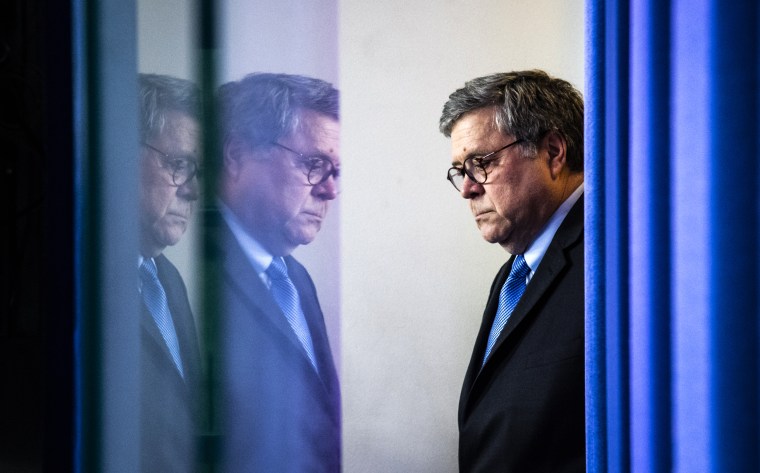Attorney General Bill Barr has been known to deliver some unsettling speeches since taking over the Justice Department. It was last fall, for example, when the Republican delivered surprising remarks at Notre Dame, condemning societal ills on conspiring American secularists.
As regular readers may recall, a month later, Barr delivered equally disturbing remarks defending a dramatic vision of expansive presidential power and accusing "the left" of engaging in "the systematic shredding of norms." It prompted even some conservative-leaning lawyers to rebuke the attorney general's radicalism.
A year later, the attorney general is erasing the line between playing the role of political operative and serving as the nation's chief law enforcement official.
In scathing remarks against his own staff, Attorney General William Barr said Wednesday that the Justice Department has recently acted "more like a trade association for federal prosecutors than the administrator of a fair system of justice" and equated some prosecutors to preschoolers and "headhunters." Too much deference is given to career prosecutors, rather than to politically appointed leaders who can be held accountable at the ballot box, he said in remarks likely to further strain relations between Barr and some of the Justice Department's career prosecutors.
He added that he finds it "annoying" that some people believe political appointees shouldn't interfere in criminal investigations. As far as Barr is concerned, "all prosecutorial power" is vested in the office of the attorney general. It's a line of thought that has apparently led Donald Trump's fixer to believe that if he wants to use his office to meddle in cases of interest to the White House, he believes he can do as he pleases.
Barr proceeded to, among other things, ridicule journalists and deride the Black Lives Matter movement. "They're not interested in Black lives," the Republican argued. "They're interested in props, a small number of Blacks who are killed by police during conflicts with police -- usually less than a dozen a year -- who they can use as props to achieve a much broader political agenda."
In June 2016, Bill Clinton exchanged pleasantries on a tarmac with then-Attorney General Loretta Lynch, and according to everyone involved, it was a fairly brief and inconsequential social interaction. Such conversations are not uncommon when prominent political figures are in the same place at the same time.
Republicans and much of the political media was nevertheless apoplectic, insisting that the Clinton/Lynch conversation raised the prospect of politically motivated decisions at the Justice Department. Four years later, as The Atlantic's Adam Serwer noted, the Barr/Trump position is "political influence on prosecutions is great and we need more of it."
Or put another way, the attorney general's critics have spent months arguing that he's politicizing federal law enforcement. Last night, Barr effectively said the criticisms are true -- and he's unembarrassed by it.
Of course, the problem isn't just what the attorney general is saying; it's also what he's doing. Barr's remarks came just hours after the Wall Street Journal published this report:
Attorney General William Barr told the nation's federal prosecutors to be aggressive when charging violent demonstrators with crimes, including potentially prosecuting them for plotting to overthrow the U.S. government, people familiar with the conversation said. In a conference call with U.S. attorneys across the country last week, Mr. Barr warned that sometimes violent demonstrations across the U.S. could worsen as the November presidential election approaches. He encouraged the prosecutors to seek a number federal charges, including under a rarely used sedition law, even when state charges could apply, the people said.
A New York Times report added that the attorney general also "asked prosecutors in the Justice Department's civil rights division to explore whether they could bring criminal charges against Mayor Jenny Durkan of Seattle for allowing some residents to establish a police-free protest zone near the city's downtown for weeks this summer."
A few months ago, 2,300 former Justice Department and FBI officials -- from both Republican and Democratic administrations -- publicly called for Barr's resignation. I'll be eager to see whether that number grows in light of the attorney general's latest political antics.
